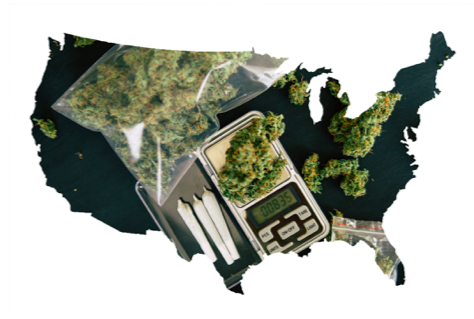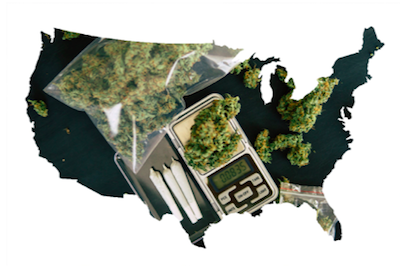The Marijuana Tax Act of 1937
This tax act was the first federal law to criminalize cannabis all over the United States. It imposed excise tax on the possession, transfer, or sale of hemp products; thus, criminalizing the use of cannabis.
In October 1937, a farmer named Samuel Caldwell was arrested for selling cannabis. He was eventually prosecuted and sentenced to four years of tough labour.
The Philippines was the primary source of the United States for imported hemp fiber. When it was colonized by the Japanese, Americans had no choice but to cultivate industrial hemp domestically. The last hemp fields in the United States were planted in Wisconsin in 1957.
The War on Drugs
President Richard Nixon signed the Controlled Substances Act of 1970 into law as part of the country’s “war on drugs”. It revoked the Marijuana Tax Act and classified cannabis as a Schedule I drug with a huge risk for abuse and no medicinal usage.
In 1972, the National Commission on Marijuana and Drug Abuse released a report that recommended lower penalties and partial prohibition for the possession of marijuana, provided that the amount was small enough. However, the president merely ignored it.
Provision for Medical Marijuana
In the 1970’s up to the 1980’s, people became interested again to use cannabis for medicine. After all, it has proven to be effective in providing relief to AIDS and cancer patients who had wasting syndrome and chemotherapy.
In 1996, California legalized medical marijuana. It became the first state to do this in defiance of the federal law. Then, in 2001, Canada was allowed to adopt the system for regulating cannabis for medicinal purposes.
Due to the Compassionate Use Act of 1996, California became the first ever state to legalize the use of cannabis for medicinal purposes. It became the first state to do this in defiance of the federal law. Other states soon followed and allowed the use of cannabis for medicinal purposes too, but with certain limitations.
Portugal also decriminalized drugs and maintained a prohibition on their sale and production. Subsequently, other countries in Latin America and Europe decriminalized the use of cannabis. In 2013, President Jose Mujica of Uruguay signed the legislation to legalize the use of cannabis for recreational purposes, making Uruguay the first country to legalize cannabis in modern times.
According to the World Drug Report of the United Nations, cannabis was the most trafficked, consumed, and produced drug worldwide in 2010. In 2015, it was found that it reached up to 238 million users.
Today, the possession and use of cannabis is illegal under the federal law for whatever purpose, according to the Controlled Substances Act of 1970. It was said to have no medical use and with a huge possibility for abuse. Thus, it is not allowed to be used, even for medicinal purposes. Then again, the policies that are involved in the recreational and medical use of cannabis vary in different states.
In thirty-three states, its medical use is legal but only with a recommendation from a doctor. Fourteen states have limitations with regard to its use due to its cannabidiol (CBD) content. Nonetheless, the Rohrabacher-Farr amendment prohibits the federal prosecution of people who comply with the state laws on medical marijuana.
The Marijuana Justice Act of 2019
This bill was taken to Congress on February 28, 2019. It proposed for cannabis to become legal on a federal level. It also proposed for cannabis possession charges to be eradicated in the United States.
In essence, The Marijuana Justice Act of 2019 aims to legalize cannabis all over the United States as well as take it off the list of controlled substances by the Drug Enforcement Agency. It also aims to expunge criminal records of people who have been charged with crimes related to cannabis possession. In fact, many cities have started to take on this process.
The Marijuana Justice Act aims to reverse the years of failed, unfair, and unjust policy by taking cannabis off the list of controlled substances and finally legalizing it under the federal law. However, it is not enough to merely decriminalize cannabis. Everyone should also fix the problems caused by reinvesting in communities affected by War on Drugs.
This bill would not only make marijuana legal throughout the country, but that it would lead to more incentives as well. After all, many experts believe that the War on Drugs was nothing but a war on people who are poor, colored, or are suffering from mental disorders.
Canada
In 2017 cannabis became legal in Canada. There were positive findings on the benefits of cannabis for medicinal use and there was a sharp increase in the number of investors looking for new opportunities. The project ‘New Leaf’ became the first retail cannabis store in Canada. In Ontario, to buy weed only through online dispensaries will be prohibited, and stores will be opened until April of 2019. In terms of possession, you can have 30 grams on your person and 150 grams at home (in this case you still cannot grow).
Manitoba and Alberta introduced one of the most liberal policies regarding cannabis. In Manitoba, people will not be allowed to grow plants at home, but you can go to a store or cannabis lounge where there will be a professional counter assistant ready to help you. In Alberta, the legal age for using marijuana is 18. Adults will be able to grow up to four plants at home and use them in case of medical need. Canada’s government has agreed on a minimum age of 18 and 19 years for other provinces.
Canada is currently studying the legalization of recreational marijuana in 2021-2022. Legalization will lead to a reduction in cannabis consumption and criminal offences, according to Canadian officials.
United Kingdom
In the UK, the issue of legalization of cannabis has been postponed. The public debate on the legalization of cannabis is still in progress. The special report prepared by the Advisory Committee on Drug Misuse strongly suggests that drugs should be legalized. The UK’s government announced in December of 2018 that it intends to legalize cannabis by the end of this year, but not for recreational purposes. In Switzerland, the new Cannabis Act was approved by parliament on January 3, 2018 and was signed by the Swiss president on January 18. The Cannabis Act will come into force in April 2020, and cannabis will be sold through pharmacies starting then.
Germany
Germany has not set a date for legalization yet. The German government plans to legalize cannabis for medical purposes in the coming years. The Netherlands is considering the legalization of production and sale of marijuana, but there are no official proposals yet. The country has already legalized cannabis for medicinal use in 2013. In other European countries, such as Sweden and Denmark, they have not passed any laws concerning cannabis.
In other parts of the world, the legislative framework on the use and sale of cannabis is changing. Countries that have Marijuana Dispensary Laws usually adopt some form of patient registry, which may provide some protection against arrests for possessing up to a certain amount of marijuana for personal medical purposes.
Some of the most common policy questions about medical marijuana include how to regulate its recommendation, distribution and approval of patient registration. Some states and regions that do not have pharmacy regulations are experiencing the thriving development of new businesses and hope to obtain approval before making stricter regulations. Medical marijuana growers or dispensaries are often called “caregivers”, and each person may be limited to a certain number of plants or products. In addition to any national regulations, this issue may also be regulated at the local level.























